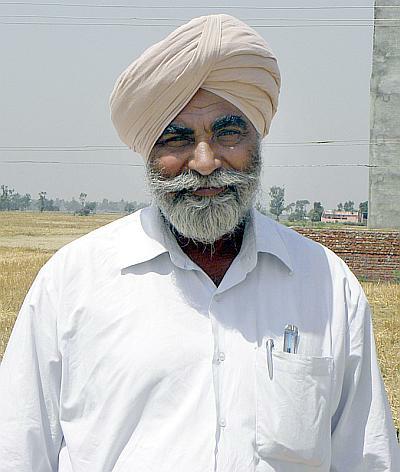
The Bhatala, Gurdaspur-based farmer took a loan of Rs 80,000 from a local moneylender, which he is unable to repay. However, he says he will not take the drastic step 3,000-odd Punjabi farmers have taken in recent years -- commit suicide.
At the start of the election process in Punjab it was expected that the farmers's suicides and the problems they faced would be a major issue during the campaign. However, at the campaign meetings we have covered, few leaders have spoken about this issue.
Only Vinod Khanna, the Bharatiya Janata Party candidate from Gurdaspur, made a passing reference to it when he told voters that he would look into the farmers's grievances if he is elected to the Lok Sabha for yet another term.

Similar stories can be heard from every part of Punjab where agriculture is the main occupation. Almost 85 per cent of the state's population relies on agriculture and it is strange that no political party has made it an election issue.
While the politicians continue to evade the issue during their campaigns, the farmers say they will vote only for the party which addresses this issue.

The union, which has met regularly with farmers across the state, has told them not to vote until their problems are addressed by the political parties.
Gurmeet Singh, who runs a small tea stall near Chandigarh, used to be a farmer.
"I had taken a loan from a moneylender, but I managed to repay it quickly. Now I don't have the guts to go back to farming. I am sure I will need to take a loan to cultivate my fields, and this time I will not be able to repay it. The problem is I never got what I spent on the fields."
He adds that moneylenders provide easy cash at very high rates of interest. "Due to the easy availability of money, farmers fall prey. The interest goes up each day, like how the seconds needle ticks on the clock."

The farmers, the report points out, do not have easy access to credit facilities from nationalised banks and have abandoned agriculture as a consequence.
There is also a demand-supply mismatch in the market, the report adds. In Punjab, there is a surplus of grain, hence demand has declined and so have the prices.
The state government claims it has evolved a plan to provide subsidies to the farmers, a project currently on hold since the Election Commission of India's Model Code of Conduct is in operation.
The farmers say their lives are more important than the Election Commission's norms. "How can the Commission stall projects which concerns our daily lives?" one farmer asked. "The Commission will be responsible for the low turnout since we will not vote unless the government comes to our rescue immediately."